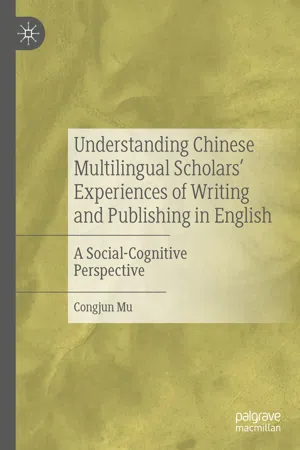1.1 Background of the Study
It has, perhaps, become a global issue that the great pressure academics around the world have felt is to publish their findings or ideas in higher-ranking journals in English, no matter whether they are native speakers or non-native speakers, and no matter whether they are from the center or the periphery of academic community (Cargill & Burgess, 2017; Hyland, 2019; Swales, 2004). Novice researchers such as postgraduate students are required to publish one or two articles in SCI (Science Citation Index) journals (more than 95% of which are in English) to graduate (Casanave & Li, 2015; Hyland, 2015), and junior scholars are also eager to publish for reasons of contract renewal, tenure, and promotion ( Flowerdew, 2015). This high-pressure environment results in fierce competition in international publications . It is reported that the rejection rate in some prestigious journals is even as high as 93% (Hyland, 2012). Against this background, a new branch of English for Academic Purpose (EAP) research, that is, English for Research Publication Purposes (ERPP) has grown quickly in recent years to address the concerns of professional researchers and postgraduate students who need to publish in peer-reviewed international journals (Cargill & Burgess, 2008). A large number of studies in ERPP have reported the challenges and pressure experienced by English as an Additional Language (EAL) scholars from almost every corner of the world, for example, Hong Kong (Flowerdew, 1999a, 1999b; Li & Flowerdew, 2009), mainland China (Lei & Hu, 2019; Li, 2014; Mu & Zhang, 2018; Tian, Su, & Ru, 2016; Zheng & Gao, 2016), Taiwan ( Huang, 2010), Poland (Duszak & Lewkowicz, 2008), Brazil ( Santin, de Souza Vanz, & Caregnato, 2016), Germany ( Schluer, 2014), Romania ( Bardi, 2015; Muresan & Pérez-Llantada, 2014), Spain ( Moreno, Rey-Rocha, Burgess, López-Navarro, & Sachdev, 2012; St. John, 1987), Russia ( Korotkina, 2018), Mexico (Hanauer & Englander, 2011, 2013), South Korea ( Cho, 2009), Indonesia (Cargill et al., 2017; Farley, 2018), Canada ( Gentil & Séror, 2014), Hungary (Lillis & Curry, 2006), India (Thorat & Verma, 2017), Iran (Gholami & Zeinolabedini, 2017; Karimnia, 2013), Italy ( Giannoni, 2008), and Sudan (ElMalik & Nesi, 2008). It seems that the situation of academics being pressured to publish in elite international journals is unlikely to change in the near future; thus, ERPP may exist as a subject of study, exploring details of the issue in depth, for years to come.
In addition to the above-mentioned journal research articles , there are book-length publications investigating EAL researchers’ experiences in writing and publishing in English (e.g., Berkenkotter & Huckin, 1995; Cargill & Burgess, 2017; Curry & Lillis, 2018; Habibie & Hyland, 2019; Hanauer & Englander, 2013; Hyland, 2015; Lillis & Curry, 2010; Pérez-Llantada, 2012; Sheldon, 2018). These ground-breaking publications have explored ERPP from various aspects. For instance, Berkenkotter and Huckin (1995) proposed the concept of “news value” in research articles. Lillis and Curry (2010) discussed the politics of localization and globalization in academic publications and the hegemonic position of English-medium journals from the social practice perspective. In particular, they contributed to research with their innovative approaches such as text-oriented heuristics, textual history, and social networking analysis. Hyland’s (2015) comprehensive book has explored almost all controversial issues in ERPP such as the dis/advantage of EAL scholars, localization and globalization, bias from the “gatekeepers (editors and reviewers),” and open access journals. Hanauer and Englander (2013) applied a quantitative approach to Mexican scientists’ difficulties with and anxieties about international publications. The edited book by Cargill and Burgess (2017) is a collection of the perspectives from a group of researchers and practitioners who met in Coimbra, Portugal in 2015 for the PRISEAL (Publishing and Representing Research Internationally: Issues for Speakers of English as an Additional Language) and MET (Mediterranean Editors and Translators) meetings. In the book, they explicitly argue that scholars whose first language is not English have a greater challenge in producing English-language publications than do their anglophone counterparts. Although the challenge and pressure faced by Chinese multilingual scholars have received considerable attention from ERPP researchers (Flowerdew, 1999a, 1999b; Huang, 2010; Lei & Hu, 2019; Li, 2014; Li & Flowerdew, 2009; Mu & Zhang, 2018; Tian et al., 2016; Zheng & Guo, 2018), unfortunately, to date there are few book-length explorations of their experiences and strategies in writing and publishing international journal articles in English. To fill this gap, the present book will explore the challenges and strategies Chinese multilingual scholars report in the process of writing and publishing in English, applying both quantitative and qualitative approaches. This book has several important advantages over the above-mentioned publications. First, with its focus exclusively on Chinese multilingual scholars, it will contribute to the field from a perspective of a specific geographical context. Second, its unique features such as a new ethnographic case approach and a new taxonomy of multilingual writing and publishing strategies may interest academics in the fields of EAP and applied linguistics. Third, like Hanauer and Englander’s (2013) book focusing on Mexican scientists, this book is centered on Chinese multilingual scholars, one of the largest groups of scientists in the world. It will facilitate the advance of international science and technology when Chinese scientists have improved their English writing ability with the help of this book.
Since this volume focuses exclusively on Chinese multilingual scholars writing and publishing ...
